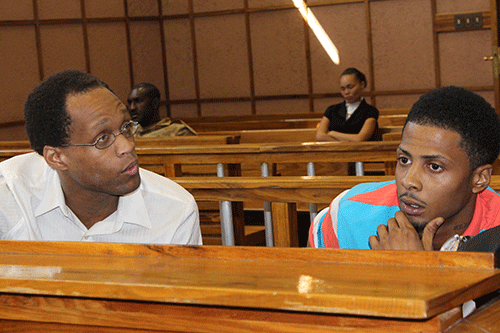Windhoek High Court Christi Liebenberg has convicted two American citizens of murder.
Until yesterday, Marcus Thomas and Kevan Townsend stood accused of the assassin-like murder of Namibian André Heckmair in Windhoek on 7 January 2011.
The judge found that Thomas and Townsend acted with a common purpose and with intent when they shot Heckmair in the head in Gusinde Street, a cul-de-sac in Klein Windhoek. While there is no direct evidence that links the accused to the murder and robbery, the circumstantial evidence in its totality is overwhelming, Judge Liebenberg noted.
Thomas and Townsend were facing six counts, including one of murder, another of robbery with aggravating circumstances, three counts of contravening the Arm and Ammunition Act, and one count of defeating or attempting to defeat the course of justice.
Both opted not to testify in their defence after the state closed its case and applied for a discharge in terms of Section 174 of the Criminal Procedure Act, which was dismissed by Liebenberg.
Since they did not take the court into their confidence, Liebenberg stated that the only evidence before the court was that of the state witnesses and the profuse denials of the accused about the alleged involvement in the commission of the offences.
What is left to be determined, the judge said, is whether, in the light of the evidence as a whole, the guilt of the accused was established beyond a reasonable doubt.
“Circumstantial evidence should not be approached upon a piece-meal basis, but the cumulative effects of all the facts must be weighed together – and only thereafter, the accused is entitled to the benefit of any reasonable doubt the court may have as to whether the inference of guilt is the only reasonable inference that could be drawn from the proven facts,” Liebenberg said.
He continued: “Although differences and contradictions by state witnesses cannot be ignored during the court’s assessment of the evidence, these discrepancies, when holistically viewed, are not material and fall short of discrediting any witness”.
On the contrary, the judge said, what appears to be most significant is that the evidence of these witnesses is corroborative in material respects.
With regards to the question of common purpose, it must be considered in light of all the evidence and not in isolation, the judge said.
It is also Liebenberg’s position that the evidence demonstrated the accused persons jointly planned their actions and acted with a common purpose.
“When considering the cumulative effect of the evidence presented, the court is satisfied that the only reasonable inference to draw a conclusion to reach from the proved facts is that the accused persons planned and committed the murder. What may further be inferred from these facts is that they acted with direct intent when shooting the deceased in the head with a firearm,” the judge stated.
Liebenberg added: “Given the close relation in time and place between the commission of the murder and the robbery of the deceased’s cellphone and wallet, it is further inferred that the accused persons robbed the deceased of his property during the murder”.
However, the judge said, the evidence did not prove that Townsend was involved in the importation of the firearm parts that form part of the charges on the Arms and Ammunition Act.
But the judge said it does bear out the fact that Townsend was the one who actively enquired about a firearm for sale in Namibia.
Townsend was also not involved in destroying the notebook that contained notes about the firearm parts, Liebenberg said.
The evidence further disclosed proof that Thomas dispatched from Finland and brought into Namibia a silencer for a firearm and two firearm barrels, the court found.
The judge, furthermore, said there is direct corroborated evidence that the accused persons bought a 7.65mm pistol plus ammunition from the street.
It is not in dispute that the accused persons set up a lunch meeting with the deceased and there was contact between them shortly before he was killed, and that Heckmair’s cellphone and wallet were unlawfully removed after he was killed.
Also, the judge said, a notebook of the accused with entries made about the parents of the deceased and place of business are prima facie links to them.
In the end, Liebenberg was convicted both on the murder and robbery charge, Thomas on the importing of firearm count and Townsend guilty on the possession of the firearms charge in relation to the gun barrels.
He found both guilty on the possession of firearms and ammunition charge, and Thomas guilty on the attempting to defeat or obstruct the course of justice charge.
The matter will return to court on 18 September for pre-sentencing procedures.
Thomas was represented by Salomon Kanyemba and Townsend by Mbanga Siyomunji.
The state was represented by deputy prosecutor general Antonia Verhoef.
– rrouth@nepc.com.na
Pic: Americans
Caption:


